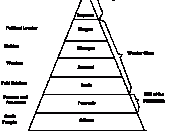Travis Tameirao
November, 2009
Introductory to Sociology
Take Home Exam
Examine the United States today in terms of Marx's model of class-stratification. To what extent can one explain the social relationships between social classes as "determined"by class-conflict or class antagonism. You may consider such issues as: (1) the primitive accumulation, (2) the industrial reserve army, (3) the labor theory of value, (4) James Gilligan's thesis, (5) the war on drugs, (6) the Wall Street "bailout"and its controversies, (7) the Employee Free Choice Act, (8) Emigration policy, *9) unionizing efforts, (10) wages vs. proficts, (11) ideologies, (12) pharmaceutical companies and public health, (13) global class conflict (I.e.e Iraq, etc.,) (14) the NAFTA and FTA treaties, (15) conflict of interest(?) in the selection of the new President's economic team and government officers. How does "False consciousness"or the lack of "class consciousness"mitigate against the awareness of class-conflict? ON the other hand, you may hypothesize that the functionalist thesis of a harmony of interest between classes trumps Marx's analysis of "class warfare."
You must Provide Evidence for your assertions.
"Stratification refers to the division of society into layers. These layers are distinguished by unequal rewards and life chances. Most sociologists see stratification as involving a classification not only of the groups, but also of the relationships that exist between them" (social stratification class, race, and gender in sociological perspective)
In briefly evaluating the classical and modern explanations of social stratification in the United States, it's important to understand class position, and discard assumptions based on the nature of inequality. With this in mind, "it seems that most of these theories come from fairly elite class perspectives and, in turn, tend to be more pessimistic about bringing change to the inequalities that are being evaluated". (social stratification class, race, and gender in sociological perspective )...


